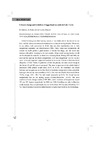Please use this identifier to cite or link to this item:
https://accedacris.ulpgc.es/jspui/handle/10553/17522
| DC Field | Value | Language |
|---|---|---|
| dc.contributor.author | Abella Pérez, Elena | es |
| dc.contributor.author | Marco, Adolfo | es |
| dc.contributor.author | López-Jurado, Luis Felipe | es |
| dc.date.accessioned | 2016-06-21T02:31:49Z | - |
| dc.date.accessioned | 2018-06-15T09:25:25Z | - |
| dc.date.available | 2016-06-21T02:31:49Z | - |
| dc.date.available | 2018-06-15T09:25:25Z | - |
| dc.date.issued | 2007 | es |
| dc.identifier.uri | https://accedacris.ulpgc.es/handle/10553/17522 | - |
| dc.description.abstract | Global warming can affect nesting success of sea turtles due to the rise of the sea level and the subsequent increased inundation or erosion of nesting beaches. Moreover, it can reduce male production to levels that can alter reproduction due to their temperature dependant sex determination (TSD). Now, mean nest temperatures all around the world predict a predominance of female hatchlings, and this trend may increase with global warming in the next decades. | es |
| dc.format | application/pdf | es |
| dc.language | eng | es |
| dc.source | 14th European Congress of Herpetology and SEH Ordinary General Meeting, Porto (Portugal), 19-23 September 2007. Pag. 42 | es |
| dc.subject | 24 Ciencias de la vida | es |
| dc.subject | 2401 Biología animal (zoología) | es |
| dc.subject | 240116 Herpetología | es |
| dc.title | Climate change and the evolution of loggerhead sex-ratio in Cabo Verde | es |
| dc.type | info:eu-repo/semantics/conferenceObject | es |
| dc.type | ConferenceObject | es |
| dc.investigacion | Ciencias | es |
| dc.rights.accessrights | info:eu-repo/semantics/openAccess | es |
| dc.type2 | Actas de congresos | es |
| dc.identifier.ulpgc | Sí | es |
| item.fulltext | Con texto completo | - |
| item.grantfulltext | open | - |
| crisitem.author.orcid | 0000-0001-6380-6130 | - |
| crisitem.author.fullName | López Jurado, Luis Felipe | - |
| Appears in Collections: | Actas de congresos | |
Page view(s)
44
checked on Jan 10, 2026
Download(s)
22
checked on Jan 10, 2026
Google ScholarTM
Check
Share
Export metadata
Items in accedaCRIS are protected by copyright, with all rights reserved, unless otherwise indicated.
